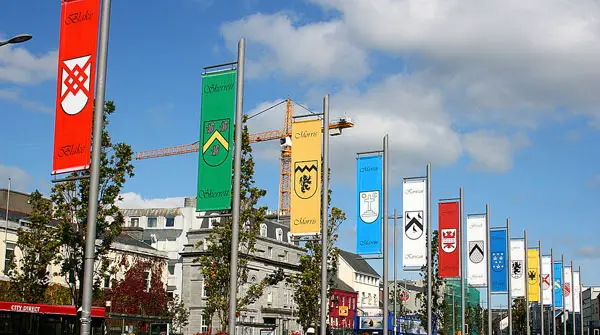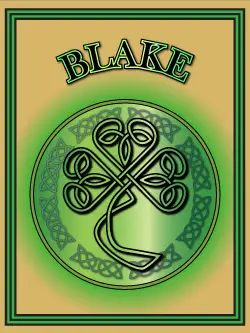Blake is a popular name in Ireland and also in Britain, America, Canada and Australia. There is more than one origin of the name we now know today.
An Anglo-Norman version developed in England in the late 11th century. It derived from the word ‘blac’, which was a description for a person with a dark complexion.
Strangely, the English word ‘blaac’ meant the total opposite, a person with a pale complexion. The pronunciation was the key and when used correctly people could tell the two words apart. These would be given to people as nicknames and over time became family names.
The Irish Blake came from the Gaelic name Ó Bláthmhaic. This was made up of three parts. The first was ‘blám’, a word for flower or blossom. That would have been given to someone based on either their pleasant appearance, or more likely as a reference to where they lived, next to or near a large tree or area of wildflowers. Blám would then have been adopted as that family’s name.
The ‘mhaic’ was added to the name when the head of the family passed control down to his son. In ancient Ireland, ‘mac’ meant ‘the son of’. It is more common to see ‘mac’ added to the front of a name, but in this case, it was added to the end.
Finally, the ‘Ó’ was added to the front. This meant ‘the descendant of’. So put together, Ó Bláthmhaic was the descendant of the son of blám.
When the Normans invaded Ireland in the late 12th century, the English version came with them. Many Irish Blakes are descended from the Norman soldier Richard Caddell, known as ‘the Black’. His followers took their name from his nickname and became known as Blake.
14 Tribes of Galway
Many Blakes travelled west across Ireland, and they became one of the 14 Tribes of Galway, an alliance of powerful families in the county.
The Blakes held their position in Galway up until the 17th century when Oliver Cromwell’s invasion destroyed the dynasties of several Irish clans. When the Normans had invaded a few centuries earlier, they settled and integrated themselves into Irish communities.
The British were concerned that despite theoretically holding control over Ireland, they actually had little or no power. The Anglo-Normans had become ‘more Irish than the Irish’.
This time the British made sure they would maintain control over Ireland. They confiscated the territories of the Irish families and handed them to British settlers. The Blake family, like most others, were defeated by the military might of Oliver Cromwell.

The Irish version of the name disappeared in the following years. The British took written records of people’s names so that they could be taxed.
These names were taken by English clerks who didn’t understand how to spell Irish names like Ó Bláthmhaic, so they wrote it as they heard it, Blake. Black and Blakely were different versions that were also recorded.
The name travelled around the world when thousands of Europeans emigrated to the ‘new world’ of America and Canada from the 17th century onwards.
Famous Blakes throughout history
Edward Blake was a horse rider from Cork in the 18th century. In 1752 he challenged one of his rivals to a race, from Buttevant to Doneraile about four miles away. The rules were that both riders had to keep the Doneraile steeple in sight for the entire race. This was the birth of the racing term ‘steeplechase’.

James Blake was the bus driver who ordered black woman Rosa Parks to give up her seat for a white male in Alabama in 1955. When she refused he called the police and ordered her arrest, prompting the Montgomery Bus Boycott which eventually led to the abolition of racial segregation on public transport in America.
Blake spoke about the incident years later, saying: “I wasn’t trying to do anything to that Parks woman except do my job. She was in violation of the city codes, so what was I supposed to do? That damn bus was full and she wouldn’t move back. I had my orders.”
Modern-day Blakes
Sir Quentin Blake is famous for illustrating several of the books of children’s writer Roald Dahl. Blake also writes children’s books himself, and was the British Children’s Laureate from 1999 to 2001.
James Blake was a professional tennis player from America. He suffered a horror injury in 2004 when he broke his neck after slipping and colliding with the net post.
Blake fought back to recover and had a long and successful career, winning 10 ATP titles. During his career, Blake recorded famous victories over great names including Andre Agassi, Andy Roddick and Rafael Nadal.
Yohan Blake is a Jamaican sprinter who won silver medals in the 100m and 200m races, and gold in the 4x100m relay at the London Olympics in 2012. The only man in the world faster than Blake is his compatriot Usain Bolt.
